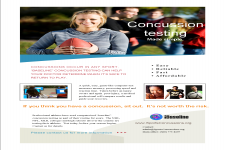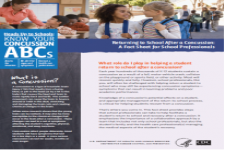Teens miss recovery clues after concussion
- Created on Thursday, 31 May 2012 22:01
- Last Updated on 30.08.2012
- Published Date
PITTSBURGH — When recovering from concussion, young athletes rely too much on how they feel, and neglect more subtle neuropsychiatric and sleep issues to decide when it’s safe to get back in the game.
https://The results of a study published online in the inaugural issue of Applied Neuropsychology: Child show that when athletes gauge their own readiness to return to play, physical symptoms like headache or nausea account for 56 percent of their self-assessment, whereas their performance on objective neurocognitive testing only accounts for 28 percent.
While the statistical analyses revealed that they judged their recovery on somatic and cognitive symptoms almost twice as strongly as neurocognitive testing, the sleep and neuropsychiatric symptoms ranked ahead of their performance on the objective test data by only a few percentage points.
“Our findings suggest that young athletes may not perceive their cognitive deficits as well as they perceive their somatic symptoms,” says Anthony Kontos, assistant research director with the Center for Sports Medicine Concussion Program at the University of Pittsburgh. “Therefore, it is important to assess their cognitive deficits using neurocognitive concussion tests and a comprehensive clinical evaluation.”

“These research results affirm what we see daily in our clinical experience,” says Michael “Micky” Collins, the Concussion Program’s executive and clinical director. “Athletes have a hard time understanding the cryptic nature of this injury, and relying only on self-assessment of symptoms is dangerous and naïve when it comes to allowing athletes back to play after a brain injury.
“Objective assessment through the use of computerized neurocognitive testing and a thorough evaluation are critical components of concussion management and return-to-play considerations.”
The research team studied 101 concussed athletes (62https:// 39 females) ages 12 to 18, who were evaluated by clinicians at the UPMC Center for Sports Medicine Concussion Program. They asked athletes to rate their “percent back to normal.”
They compared those numbers against the ImPACT (Immediate Post-Concussion Assessment and Cognitive Testing) battery and somatic, cognitive, sleep and neuropsychiatric symptom clusters to find significant correlations. In short, the athletes’ judgment was based on a small subset of the factors evaluated in concussion care.
Males in the study tended to feel more “recovered” from their concussions than females, suggesting females may experience more severe post-concussion symptoms than males, or males under-report their symptoms. Such gender differences merit more study, the researchers conclude.
Source: Read the original study DOI: 10.1080/21622965.2012.670580
Article: courtesy of Futurity.org (cc)2012 CreativeCommons.com
Photo: courtesy of Charles McCain (cc)2007 CreativeCommons.com
Questions/comments? contact Jean Rickerson at This email address is being protected from spambots. You need JavaScript enabled to view it.
Brain Health
Children and young adults scanned multiple times by computed tomography (CT), a commonly used diagnostic tool, have a small increased risk of leukemia and brain tumors in the decade following their ...
read more...-
Why concussions affect people differently
Bronx, NY — Patients vary widely in their response to concussion, but scientists haven’t unde...
-
Teens miss recovery clues after concussion
PITTSBURGH — When recovering from concussion, young athletes rely too much on how they f...
-
Discovering the roots of migraine
Common questions encountered during the post-concussion exam are often migraine-related. Do you...




Neuroscience
NFL Hall of Famer "Iron Mike" Webster's life ended in 2002 when he suffered a heart attack at age 50. Four Super Bowl rings, nine Pro Bowls, and voted to the NFL's all-time team in 2000, the driven, ...
read more...-
Progesterone seems to protect neurons after injury
It is not yet known why girls suffer concussions at a higher rate than boys. The most prevalent...
-
911 signal relay sends help to brain injury
Like emergency workers rushing to a disaster scene, cells called microglia spe...
-
GPS for the brain; the "connectome"
Athens, Ga.- University of Georgia researchers have developed a map of the human brain that shows...
Resources
- School professionals play an important role in the health of all students. Recognizing the signs and symptoms of concussion is important, as is managing their return to school post-injury.
- Some ...
- https://
- CDC's Concussion Training for Clinicians
-
Concussion Education Video Programs - ...
Parents, athletes, coaches and medical professionals have access to concussion education created...
-
New concussion guidelines for team ...
INDIANAPOLIS – Team physicians who assess and treat athletes suspected of concussion have new ...
The risk of concussions in young football players
Marjorie Albohm President, National Athletic Trainers' Association
quick links
Latest News
Concussions Occur...
...in Any Sport
REMOVE athlete from play
REFER to medical provider
REST no sports, no texting/TV
RETURN only with doctor's OK
Source: Children's Hospital Boston, Sports Concussion Clinic
































